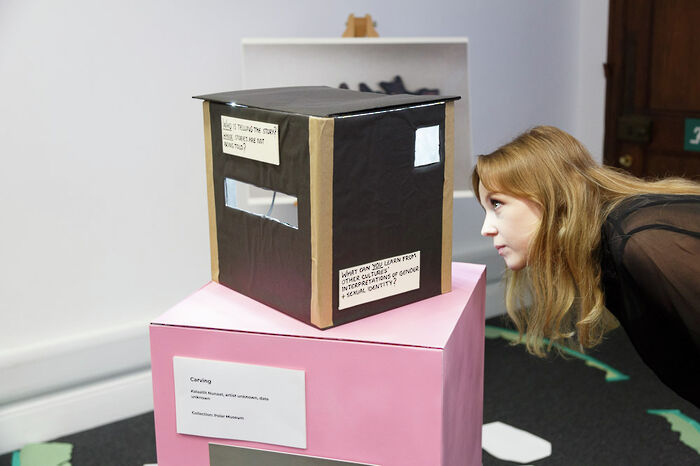‘Out at Cambridge’: Report investigates experiences of the University’s LGBTQ+ community
The report, conducted by the Department of Sociology, was created to understand what Cambridge feels like from an LGBTQ+ perspective, and where improvements are needed

Content Note: this article contains mention of homophobia
A report has been published revealing the experiences of people identifying as LGBTQ+ at Cambridge University.
The report is one of the first outputs from Q+@cam - a programme that promotes research, outreach and network-building related to queer, trans and sexuality studies at the University of Cambridge.
Last year’s Stonewall report showed two in five LGBT students (42 per cent) have hidden their identity at university for fear of discrimination, and that seven per cent of trans students have been physically attacked by another student or member of university staff in the last year.
The Q+@cam report was created to understand what Cambridge feels like from an LGBTQ+ perspective, and where improvements are needed.
Researcher and PhD candidate Elisabeth Sandler conducted 55 qualitative interviews with members of the University community between February and April this year. Those interviewed included 31 staff members and 24 students from 23 academic disciplines across all six Cambridge Schools.
The report highlighted the importance of being able to comfortably disclose sexual identities at University, and many members of the University said that if they were unable to do this, their response would be to leave the University.
Knowing whether to disclose identities was particularly problematic for younger students, the report found, as they often felt unsure about whether it was “relevant” in spaces where disclosure might be considered “out of place or intrusive.” The interviewees suggested that the inclusion of LGBTQ+ material on the curriculum would help create an encouraging and safe atmosphere for disclosure.
A postgraduate student was concerned that disclosing themselves might alter colleagues’ perceptions: “I would not want them to see me as anything other than a professional person ...the department is very competitive.”
Others noted the “emotional labour” involved in outing themselves in different contexts, feeling obliged to explain terminology, or being seen as the “token queer.”
“I don’t know whether I want to do the work of educating people,” explained one student.
A key factor increasing comfort with disclosure was whether other people, such as co-workers, students, staff and especially powerful people, such as heads of departments or college masters, were openly out. The benefit of others disclosing was mentioned across all participant groups, including undergraduate and graduate students, academic and academic-related staff, as well as administrators.
One academic staff member pointed out that "the very fact that ... we have an out-gay woman as head of the department makes a huge difference to everyone in the department, especially to people who also don’t identify as straight.”
The report also detailed the importance of outward support for the community, including rainbow flags or welcoming behaviour from the Chaplain.
Many commented on the fact that Cambridge was a safe space to be ‘out’, and provided an opportunity to experiment with one’s identity. They placed importance on the use of gender pronouns, although found it difficult when they had to correct people.
“I applied for the job at Cambridge and I realised that this was such a good opportunity to start presenting as female, as myself all the time because it was a clean break. So my first day at Cambridge was what I would consider to be my first day of presenting as myself full-time ..if I wanted to be gendered correctly, I had to tell people,” commented a staff member.
Alumni noted that the University has become a much safer space for the LGBTQ+ community in recent years: A retired staff member said, “when I came up to Cambridge in the 60s, I wasn’t out as gay. In fact, I had terrible times as an undergraduate because the college was very homophobic in those days.”
The report suggested that changes could be made to increase LGBTQ+ inclusivity, such as using examples in lectures of LGBTQ+ topics, adding pronouns to email signatures, posting LGBTQ+ friendly announcements and posters, and simply acknowledging the existence of LGBTQ+ people’ perspectives and experiences.
Q+@cam recognises that more research is needed in underrepresented participant groups, particularly BME students and staff, as only 11 of the participants were from non-white backgrounds.
The Vice Chancellor of the University, Professor Stephen Toope, said that the report “confirms that, although Cambridge has made progress in creating a more welcoming and supportive community for LGBTQ+ students and staff, there are still significant barriers to full participation for too many LGBTQ+ people in our community.”
 Interviews / You don’t need to peak at Cambridge, says Robin Harding31 December 2025
Interviews / You don’t need to peak at Cambridge, says Robin Harding31 December 2025 Comment / What happened to men at Cambridge?31 December 2025
Comment / What happened to men at Cambridge?31 December 2025 News / Unions protest handling of redundancies at Epidemiology Unit30 December 2025
News / Unions protest handling of redundancies at Epidemiology Unit30 December 2025 News / Varsity’s biggest stories of 202531 December 2025
News / Varsity’s biggest stories of 202531 December 2025 News / Cambridge academics stand out in King’s 2026 Honours List2 January 2026
News / Cambridge academics stand out in King’s 2026 Honours List2 January 2026









